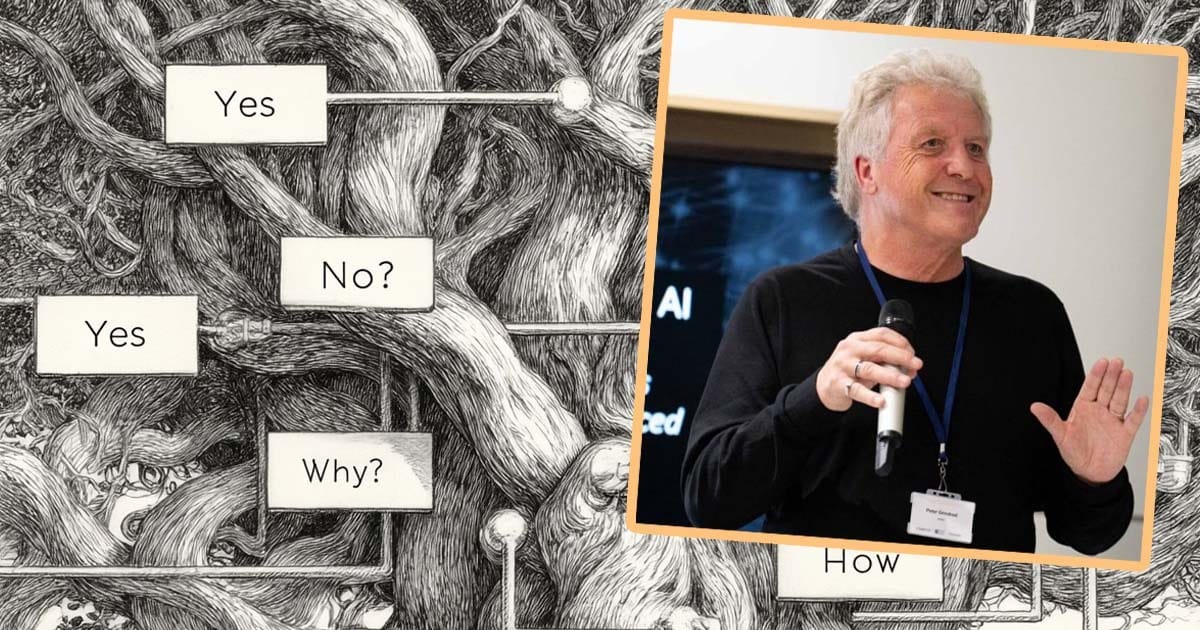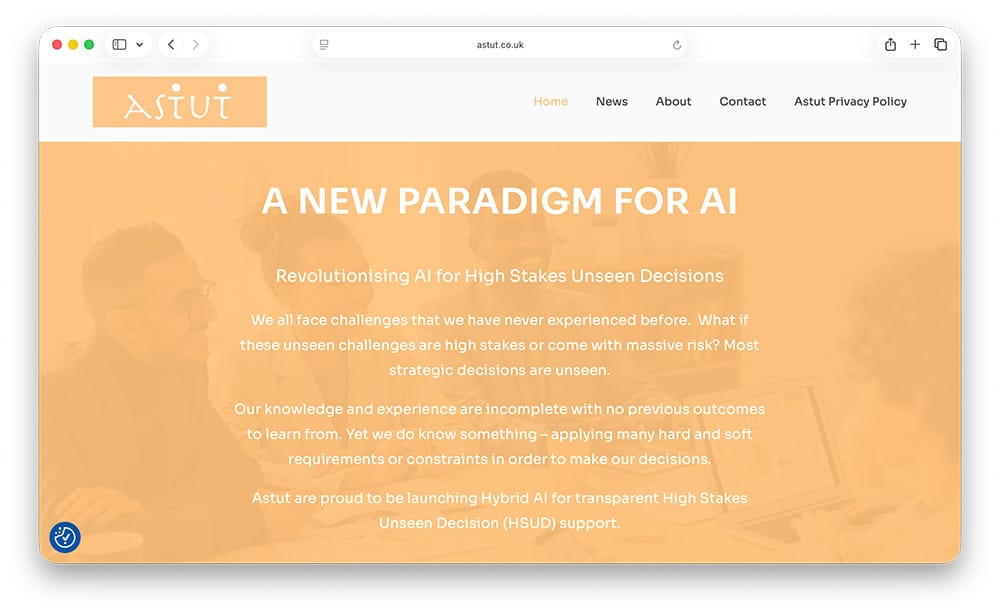- PreSeed Now
- Posts
- Tackling high-stakes problems with AI creativity, not data
Tackling high-stakes problems with AI creativity, not data
Astut wants to support critical decisions in data blind spots

PreSeed Now focuses on early-stage startups, so typically the founders haven’t appeared on the honours list quite yet (although we did once interview the son of a lord).
Today’s founder is different. But what is mathematician Peter Grindrod CBE (to my knowledge the first founder we’ve written about who has a Wikipedia page at the time of coverage) working on with his new AI startup Astut? Read on to find out.
But first:
There’s change at the top of Liverpool-based accelerator Baltic Ventures. Co-founder Claire Lewis is stepping down as CEO, and the role is open for applications, if you fancy throwing your hat in the ring.
– Martin
Don’t get SaaD. Get Rippling.
Remember when software made business simpler?
Today, the average company runs 100+ apps—each with its own logins, data, and headaches. HR can’t find employee info. IT fights security blind spots. Finance reconciles numbers instead of planning growth.
Our State of Software Sprawl report reveals the true cost of “Software as a Disservice” (SaaD)—and how much time, money, and sanity it’s draining from your teams.
The future of work is unified. Don’t get SaaD. Get Rippling.
Astut wants to solve tricky business problems that are a blind spot for most AI

Astut founder Peter Grindrod [image: PreSeed Now]
Premium subscribers get the full version of this article, plus a TLDR summary right here, and access to our Startup Tracker for updates about what this startup does next.
AI can be great at using data about the past to guide similar decisions in the future. Want to predict the best delivery routes for a logistics business? Want to figure out the best target audience for your new ad? Enough data and the right software, and you’re sorted.
But what about important, strategic decisions you’ve never made before, where there isn’t any data? AI will struggle to give you much in the way of useful guidance.
That’s where Astut, a new Oxford University spin-out, wants to step in by assisting with what it calls ‘High Stakes Unseen Decisions’.
These types of decisions are common across a range of sectors, says founder Peter Grindrod.
“I went and talked to people in retail about what they do when they got big strategic decisions. They’re awash with data, but they've got no data when they do something that's never done before. So then they tend to hire strategic consultants to come up with three decision options and pick the middle one.
“I talked to the Ministry of Defence, where they've got long- and short-term problems. A short-term problem would be ‘the enemy does something strange today, and they were quite successful. What are we going to do tomorrow? We've got no historical data for anybody doing this.’
“Long-term things might be where country X is going to invade country Y in the future. What do we need to do now that will give us sufficient options and levers to pull at that moment? Or will we be flat-footed, having to be reactive and playing catch up?”
As Grindrod explains, these kinds of decisions are completely different from the data-rich decision-making AI can typically excel at.
How it works
As an example of how Astut will work, imagine a retailer considering a significant business pivot into a new vertical. As they decide whether or not to make this significant move, they use Astut’s technology.
The product uses natural language inputs, allowing the user to explain what they’re planning to do, and the constraints they have. For example, they might include that the solution has to be legal, sufficiently profitable, aligned with the company’s brand values, and feasible with the available technology stack.
Grindrod says inputs can include hundreds or thousands of constraints, and there is support for industry-specific terminology.
Grindrod says outputs might advise users on what to do, accompanied with a list of reasons why. Conversely, it might provide a list of reasons why the user’s proposed action is a bad idea. It’s about providing insightful, reasoned options.
“We're not automating strategic decisions, we're providing strategic decision-makers with options in text, in a lexicon they would understand, that don't violate their corporate constraints… it focuses and informs decision making,” Grindrod says.
“Normally you would have to get a Bain or a McKinsey or somebody like that to generate some decision options. What's the way ahead? How do we action this? How do we navigate through these legalities? But here we're going to have an AI that can do that in extraordinarily complex situations for unseen decisions.”

Astut’s current website homepage
The story so far
Grindrod is an acclaimed mathematician who was awarded a CBE in 2005 for services to mathematical research and development.
Outside of academia, he has held roles such as being a member of the MoD’s Defence Scientific Advisory Committee. He’s also previously founded startups, including Numbercraft, an early data science company in the late 1990s which was acquired by a US company in 2003.
He returned to academia at Oxford in 2013, and eventually found himself inspired to return to entrepreneurship as the idea for Astut began to form. He says the idea began as he explored neuromorphic AI (AI based on the way the human brain works), this led him to look at all the things AI does less well than others when it comes to problem-solving with creativity, like a human.
He says he was also inspired by the work of Joel Lehman and Ken Stanley into the concept of ‘novelty search’.
“What they said was don't try and optimise an objective function, just prize novelty. So you have a meta objective, which is trying to generate more and more novel things. ‘Abandon objectives and prize novelty’ was their strap line, really.”
Grindrod is the only academic involved with Astut.
“I had to go and find a team who could work in a natural language processing environment and implement novelty search, all sorts of knowledge graphs and structures like that, build an engine that could do the novelty generation over the top of a generative AI, and then do the logical refutation, and then redo the search.”
In addition to retail and defence, Grindrod says he has spoken to strategic business consultants who see value in the proposition (“we've given some ‘warm tummy’ feelings that we had an AI offer maybe 100 different options that were all viable and didn't violate any of the imposed constraints”).
He says he has also spoken to a team using groundbreaking scientific processes to generate energy. Finance and the security sector are other likely markets for the technology.
Rather than sell the software directly as a product, Grindrod wants it to be integrated into third-party offerings via licensing deals.
At present, Astut is working on refining use cases with potential users. Grindrod expects the first version of the product to go to market next year.
Go deeper on Astut
Funding:
Astut recently raised its first external funding, a £1.6million round co-led by East X Ventures and SVV.
Upgrade to get the full story about Astut:
Founder Peter Grindrod’s vision for the future of the company
How Astut squares up to the competition
What challenges the startup faces as it grows

Subscribe to Premium to read the rest.
Become a paying subscriber of Premium to get access to this post and other subscriber-only content.
Already a paying subscriber? Sign In.
A subscription gets you:
- • Full profiles of early-stage startups every Tuesday & Thursday: go deeper on each startup
- • Access to our acclaimed Startup Tracker database of early-stage UK startups

